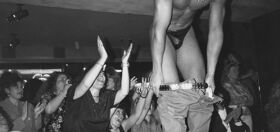
Drag icon RuPaul makes an emotional discovery about his family history in a new video from the PBS series Finding Your Roots.
RuPaul, 60, met with host Henry Louis Gates, Jr. to discuss three members of his family, traced to RuPaul via genealogy and DNA testing. This anecdote dates to 1804, in which a white slave owner freed RuPaul’s great, great, grandmother Nanette and her brother Andre from slavery. Said plantation owner, a man called Jacques Fontenette also refused to free Nanette and Andre’s mother, referred to as Negro Julie, from slavery.
In the clip, RuPaul and Gates speculate as to why.
“I wonder what precipitated giving them their freedom,” RuPaul wonders aloud.
How about we take this to the next level?
Our newsletter is like a refreshing cocktail (or mocktail) of LGBTQ+ entertainment and pop culture, served up with a side of eye-candy.
“Why do you think?” Gates presses.
Related: RuPaul calls out ‘Drag Race’ contestant’s racist past on the air
“The first thing that comes to mind,” RuPaul stammers, “is he has a relationship with Negro Julie. Somehow, through compassion of the heart, he did this. Maybe because he’s their father?”
“Love?” Gates asks.
“Love would be the number one thing,” Ru admits.
Gates goes on to explain that history does not record the nature of the relationship between Julie and & Fontenette. It does, however, make mention of a final twist in her story. Nanette and Andre spent the next 14 years trying to free Julie from bondage. Andre, just prior to his death, bought Julie from Fontenette with the intention of freeing her. Thus, Nanette freed Julie following Andre’s death.
“What’s it like to see that?” Gates asks.
“Living long enough to free your mother from slavery?” RuPaul marvels. “To not give up? Very easily, people could fade away. It’s too much.”
A teary RuPaul then goes on to recount a story about caring for his mother as she lay dying, and how the experience humbled him.
Have a look at the clip. Have some Kleenex on hand.



















GlobeTrotter
I’d bet anything that that slave owner kept Julie as his mistress. She bore him two children, which he freed, but he didn’t have the heart to part with Julie, so he kept her “in bondage”.
According to my research, there were many, many different types of slavery. There certainly was the type of slavery most often depicted in Hollywood movies involving back-breaking labor in the fields, but some people also kept slaves as housemaids, handymen, messengers and yes, even live-in mistresses and lovers.
It would make sense that “Negro Julie” belonged to this last class of slaves, which would explain her owner’s reluctance to set her free. Maybe the offer of all that cash for her freedom from her children finally won him over. Maybe she was now old and frail, and wasn’t quite the beauty she used to be. So he finally agreed to her freedom.
Patrick
Of course there were all types of “house” slaves; butlers, cooks, maids, ladies maids, kitchen helpers or scullery maids, nannies, etc. Plus, there were coachmen, groomsmen & stable boys. There were also skilled laborers, carpenters, barrel makers, weavers, seamstresses, & other specialty trades people. The large plantations all had enslaved people in these various positions. While not as miserable an existence as field hands, all of these human beings suffered as property. And, depending on the slave owner, life could be even more miserable due to torture, rape, the selling of children or other relatives & even murder. If you wish to expand your “research”, visit some of the historic house museums in the south, both plantation homes & city houses.
Cam
I get your point, but I wouldn’t use the term mistress when somebody is owned and forced to sleep with the man. For all we know Julie hated him but didn’t want to get beaten and even though she “Submitted” what produced the children was rape.
If she was happy with it I doubt the two children would have tried to years to get her out of there. Glad that the kids were freed and able to get their mother out of slavery in the end. It still is shocking that it wasn’t that long ago. His Great Great Grandmother.
Mehki
Exactly what was the point here?
Black slaves were expected to not only pick cotton, shoe horses, shovel coal, and dump slop buckets and after that backbreaking work, also got to spread their legs and their butt cheeks at night (and probably watch their children get picked for a night of servicing at the big house) and so….What exactly? It wasn’t so bad for the house n*???
Black people had to pick more than cotton!
They were diversified!
Who knew!
GlobeTrotter
@Cam: Let’s not overlook the power of the Stockholm Syndrome. Even if she were forced to sleep with him in the beginning, several victims over the years eventually come to sympathize and even love their captors. I wouldn’t be surprised if she also fell in love with him over the years and come to see herself as privileged, i.e. she had a better, safer and more comfortable life as his lover than as his field worker. She might have thought it therefore better to cooperate, maybe even securing the freedom of her two children as part of the deal.
It’s easy to sit here in the 21st century and speculate about the motives of people who lived 200 years ago, but for all we know, being kept as his love-slave was probably a better life for her and her children than being forced to pick cotton 16 hours a day.
Leash
Stockholm Syndrome might be fake sis, to this day it isn’t a recognized psychiatric disorder. The psychiatrist who invented the term never spoke to the woman he based it on, never bothered to ask why she trusted her captors more than the authorities and had an interest to discredit her because she questioned his authority and because the whole police operation back then was a mess, since Sweden has never experienced something like that before.
Leash
Thinking the slave owner kept her out of love or “compassion of the heart” says alot about how Ru sees the world or wants to see it. He strikes me as someone who lives in his own world and has lost touch with reality due to his fame.
Mehki
Agreed…. Love had nothing to do with raping women.
Nothing came from that, but the women giving birth to more free labor.
uberhund
I feel that’s a little harsh on Ru. It’s his history, not yours, and we don’t know what actually happened – we’re all just putting stories on it. If believing that there was some love between his ancestor and her owner makes him feel better about it, he’s allowed, just like I try to believe that some queer people in the past lived happy, invisible lives that we don’t know about. We all do what we can to get by, and if Ru’s story makes him feel better and come to terms with aspects of his past, that’s fine. Don’t forget, he only just found out about it – perhaps in time he might be able to accommodate a more wordly explanation, but at the moment this is all he can manage to live with.
Leash
@uberhund just to clarify: my impression of him is not only based on this story. Its the impression I get from various storys I hear hear about him or from things he says and that all add up. But obviously i don’t know him.
I agree that he just found out about it and that was, like he said, the first thing that came to mind.
uberhund
Fair point, and thanks for clarifying! Lots of love Leash!
Leash
<3 have a nice weekend :-*